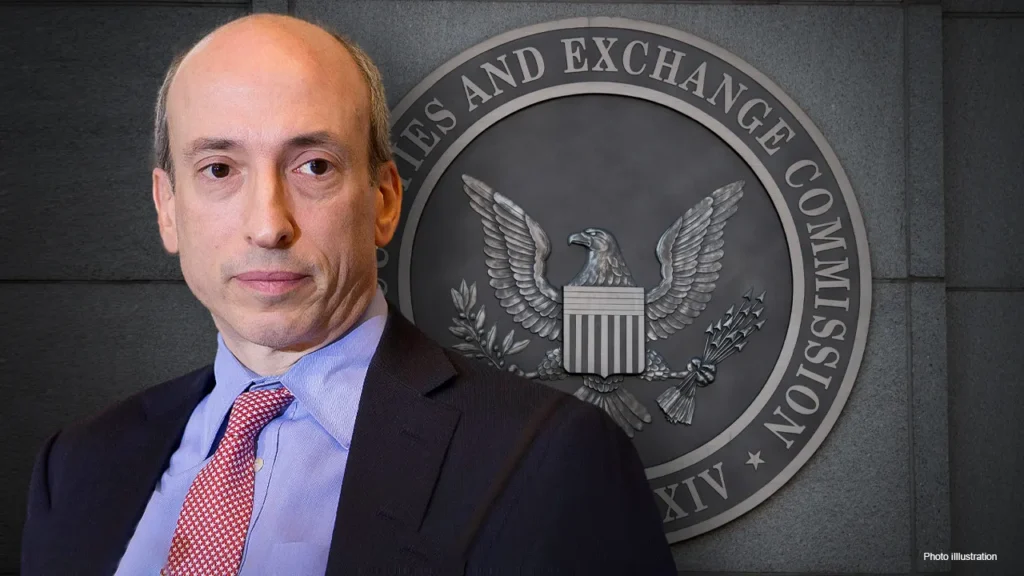In a comprehensive update from the Blockchain Association and HarrisX, the crypto industry has reported staggering compliance costs reaching $400 million due to U.S. Securities and Exchange Commission (SEC) actions. Since April 2021, when Gary Gensler took over as SEC Chair, enforcement measures have intensified, forcing major players like Ripple, Coinbase, and Kraken to reallocate massive resources towards legal defenses and compliance.
SEC’s Stringent Oversight: The $400M Financial Toll
The report, compiled by the Blockchain Association in collaboration with polling firm HarrisX, reveals a growing frustration within the crypto industry as regulatory costs continue to climb. According to the association, increased SEC enforcement has disrupted innovation, forcing companies to prioritize legal expenditures over product development and expansion. This period of heightened regulation comes as Gensler, a vocal advocate for strict oversight, has maintained that most cryptocurrencies should be classified as securities, thereby subjecting them to traditional financial regulations.
These statements have left the industry navigating an environment where “enforcement over guidance” has become the norm. With crypto firms pouring millions into compliance, calls for clear regulatory standards have become louder than ever.
A Call for Clarity: Survey Shows Public Wants Clearer Crypto Guidelines
In addition to financial findings, the Blockchain Association and HarrisX conducted a survey from October 25–28, gathering responses from 1,717 registered U.S. voters. The results speak volumes about the public’s stance on crypto regulation:
- Two-thirds of respondents indicated that the SEC should provide clearer regulatory guidelines.
- A near-even split emerged regarding political alignment, with 34% believing the GOP is more likely to support digital innovation, compared to 32% for the Democrats.
These results underscore the broad demand for regulatory transparency, which industry leaders argue could facilitate innovation while ensuring compliance. Congress, too, has proposed legislation addressing crypto standards and stablecoin regulations; however, these bills have yet to pass, leaving the industry in a state of uncertainty.
Industry Reactions and Mounting Legal Frustrations
The lack of regulatory clarity has led to a backlash among crypto executives. Earlier this month, Coinbase’s Chief Legal Officer, Paul Grewal, voiced criticism of the SEC’s actions, calling out the inconsistencies in the agency’s approach. He added that these costs ultimately impact everyone, saying, “These dollars are yours. Mine. All of ours. Think about that when you punch your clock. Think about that when you fill out your tax forms. And definitely think about that when you vote.”
Adding to the tension, the SEC recently issued a Wells Notice to Immutable, a decentralized blockchain gaming company, signaling potential enforcement action related to its IMX token. In response, Immutable, along with other crypto companies, has highlighted the need for guidelines rather than penalties, arguing that innovation in blockchain technology could be stifled by ongoing legal battles.
Even larger entities are feeling the strain; Consensys, the company behind Ethereum’s popular wallet MetaMask, recently cut its workforce by 20%, directly citing SEC actions as a factor. This decision emphasizes the wider impacts of regulatory pressure, as companies are forced to choose between growth and compliance.
The Road Ahead: Will Congress Step In?
As the industry waits for a decisive regulatory framework, many are looking to Congress for a long-term solution. Legislation currently under review addresses key issues like stablecoin standards and digital asset classification, both of which could reshape how crypto firms operate in the U.S. However, until these measures are passed, crypto businesses remain at the mercy of the SEC’s enforcement-driven strategy, leaving the $400 million compliance burden as a stark reminder of the challenges faced by the sector.
As the 2024 election draws near, the question of crypto regulation could become a defining issue, with many in the industry hoping for leadership that supports innovation while providing clear guidance. For now, though, the crypto community will keep a close watch on developments, hoping for a future where regulatory clarity allows blockchain technology to flourish.
Stay updated on the latest in crypto compliance and regulation by following us on:
- Twitter: @_KenyaCryptoMag
- Instagram: @KenyaCryptoMag
- WhatsApp: Join our WhatsApp
QUEEN WHALE
Views: 3




